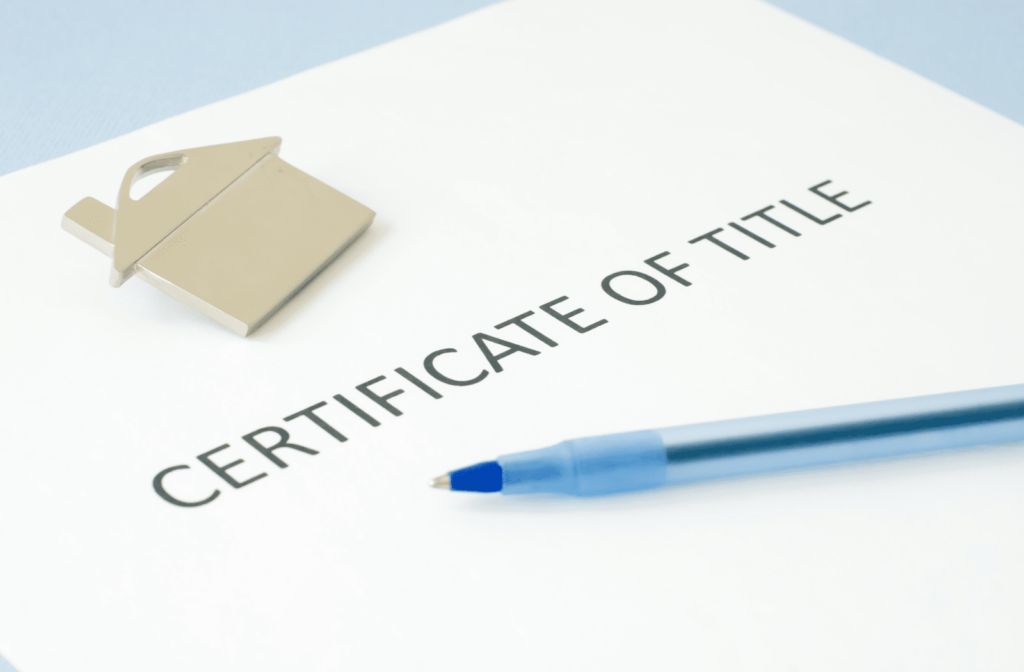When you buy or sell a home in Alberta, one of the first things your realtor or lawyer will do is obtain a certificate of title from the Land Titles Office.
As one of the most critical documents in any real estate transaction, it’s important to understand the certificate of title: where it comes from, what details it must legally contain, and what to look out for.
The information contained on the certificate of title may directly affect the purchase or sale of your property, so understanding everything about your title is an important first step.

The Alberta Land Titles Office: The Home of Property Information
Every parcel of land in Alberta is governed by the Land Titles Act and managed by The Land Titles Office. It is part of the Registry Services Division of Service Alberta responsible for housing all registered plans, titles, and documents relating to land and land rights in Alberta. There are over 160 different types of documents and plans that can be registered against a certificate of title, and all must comply with current legislation, policies, and procedures before they are accepted for registration.
The land registration system in Alberta operates under the Torrens title system, so the government has custody of all property titles, documents, and plans. All information held at the Land Titles Office is publicly-owned and is accessible, for a fee, by the general population. This means there is always a place to obtain a copy of your certificate of title if you misplace it.
What is a Certificate of Title?
A certificate of title is a government issued certificate of ownership of either surface rights or mineral rights to a certain parcel of land. Some certificates of title contain both surface and mineral rights, especially in the oldest settled areas of the province. Most commonly in residential real estate, however, the certificates of title are for surface rights only.
What Information Does a Certificate of Title Contain?
Current Registered Owner(s)
The certificate of title will reflect the full names and addresses for service of the person(s) who own that particular property.
Type of Land Ownership
The certificate of title will also reflect the form of ownership of the parcel. In Alberta, there are three (3) ways a property can be held:
Sole Owner. Either a person or an Alberta registered corporation is the sole owner of the land.
Tenancy-in-common. There are 2 or more owners, but if one dies, their share in the land goes to their estate. The owners can hold specific percentages of the property, or if no percentage is indicated their shares will be deemed to be equal.
Joint tenancy. There are 2 or more owners, but if one dies, their share in the land goes to the surviving owner(s) as a right of survivorship.
Legal Description
Every parcel of land in Alberta has a legal description that consists of written words to delineate the geographic boundaries of the property by reference to registered survey plans and the Alberta Township Survey system. The legal description will indicate whether it is for the surface rights (by excepting out all mines and minerals), mineral rights or both.
What May Be Registered on a Title?
Encumbrances, Liens & Interests
Not all titles have registered encumbrances, liens, and interests against them. However, if you have secured financing, or another party has an interest in your property, your title may contain them.
With the exception of registered interests that are meant to stay on title, items including financial encumbrances, liens and security interests must be discharged from the certificate of title when your property is sold and transferred.
Mortgage/Financial Encumbrance
If you have a loan where you have given security to the lender that includes a mortgage of lands, you must register the banking and loan information on the certificate of title. This instrument will stay registered against the certificate of title until it is paid off and the loan facility is no longer required by the lender, and must be discharged by your lawyer when you sell the property.
Caveats
The word caveat means “beware” in Latin. A caveat registered against a certificate of title acts as a warning or formal notice that someone may have an interest in a property, although it does not in and of itself create an interest in the lands. Caveats can be registered for a slew of different interests, including unpaid vendor’s liens, beneficial ownership, rights to purchase a property, leases, dower interests, and assignments of rents, just to name a few. Caveats can be disputed and removed if the interest claimed is not upheld by the courts. Caveats may or may not need to be removed during a sale, depending on the nature of the interest being claimed.
Easements, Encroachment Agreements
An easement is a legal right to use or share land with others, or prevent it from being used in a certain way. For example, in a semi-detached dwelling, you may share one or more walls with the neighbouring property called a “party wall”, the use and maintenance of which will be governed by a party wall agreement. Encroachment agreements are registered on title in instances where a building or improvement extends from one owner’s land onto another’s property, and the owners have agreed to let the encroachment remain, such as the eaves where a dwelling is situated right on the property line. These shared agreements are registered on title as easements and encroachment agreements.
Restrictive Covenants
Restrictive covenants are instruments that are used to control the development and use of land. They must be negative in nature, which means that they must prevent or restrict the use of the land, and there must be a dominant tenement (someone to enforce the restrictive covenant) and a servient tenement (someone who has to follow the restrictions). Restrictive covenants were used in Alberta prior to the advent of land use bylaws to control development of neighbourhoods. They are commonly used today to enforce architectural controls that maintain the aesthetic of certain communities after they have been built and sold by a developer. Restrictive covenants typically remain on a certificate of title after a conveyance.
Utility Rights of Way
If you have a utility structure on your property, such as a power box or underground power lines, a registered utility right of way on title shows that the owner has granted the utility company or municipality access to their property for maintenance purposes. This type of interest stays registered against the certificate of title after it is transferred.
Liens
A lien registered on title means that someone is claiming that money is owed to them by the owner of the property under a statute that grants them the right to place a lien against the property. The most common type of lien is a builder’s lien, which can be registered when a contractor provides services or materials to improve the lands.
Certificates of Lis Pendens and Writs of Enforcement
If you have been sued in relation to land, and a judgement has not yet been granted, a plaintiff can register a certificate of lis pendens against the certificate of title to show that there is litigation ongoing in respect of the property. When a judgement is granted against an owner of land, a writ of enforcement issued by the Court of Queen’s Bench may be filed against the certificate of title showing that the plaintiff now has an actual legal interest in the property, regardless of whether the debt owed by the owner is related to the property or not.

Transferring Title
Whether you are buying or selling property you need to thoroughly review your certificate of title before signing any documents, such as a Real Estate Purchase Agreement or a Transfer of Land document. The goal of any real estate transaction is to have a title clear of adverse registrations when it is transferred – if not careful, unwanted registered interests can follow the title, leaving the new owner responsible for unpaid debts of the seller or with lands that do not suit their purposes.
Purchasing Property
If you are interested or considering a certain property, one of the first things you should do is review the certificate of title to ensure you end up with a certificate of title free of any interests that will be detrimental to your own interests and any restrictions that do not allow for your intended use of the property. The exceptions are instruments such as utility rights of way or certain encumbrances that will “run with the land” or remain on the title once it is transferred. However, it is important to understand all registered interests on the property in order to protect yourself.
Selling Property
If you are selling and transferring the title to another party, you must review your title to ensure it is clear of any registered interests that will need to be discharged as part of the sale. If you have a mortgage or line of credit, this will be discharged by your lawyer in the course of the legal process. However, depending on how long you’ve had the property, there may be things registered on your title you don’t even know about. It is extremely important to clear up any adverse registrations on your certificate of title as it could potentially delay or terminate your sale.
Call the Real Estate Professionals
At KH Dunkley Law Group, our real estate lawyers have decades of experience completing thousands of residential real estate transactions. Whether you are buying or selling, we’ll ensure you fully understand your certificate of title as well as all other documents required for your transaction. We work with your real estate agent, the other party’s lawyer, and your financial institution to ensure a smooth and successful transaction where your interests are protected at all times.
Contact our real estate group today and let’s get started. View our flat fee pricing for more information.
This memorandum is for informational purposes only, does not constitute legal advice or an opinion, and does not create a solicitor-client relationship. This is an overview and is not intended to be a complete and exhaustive explanation of the concepts covered. This information may become inaccurate based on passage of time or changes in the law. Nothing herein should be relied upon without seeking the advice of a lawyer.
















